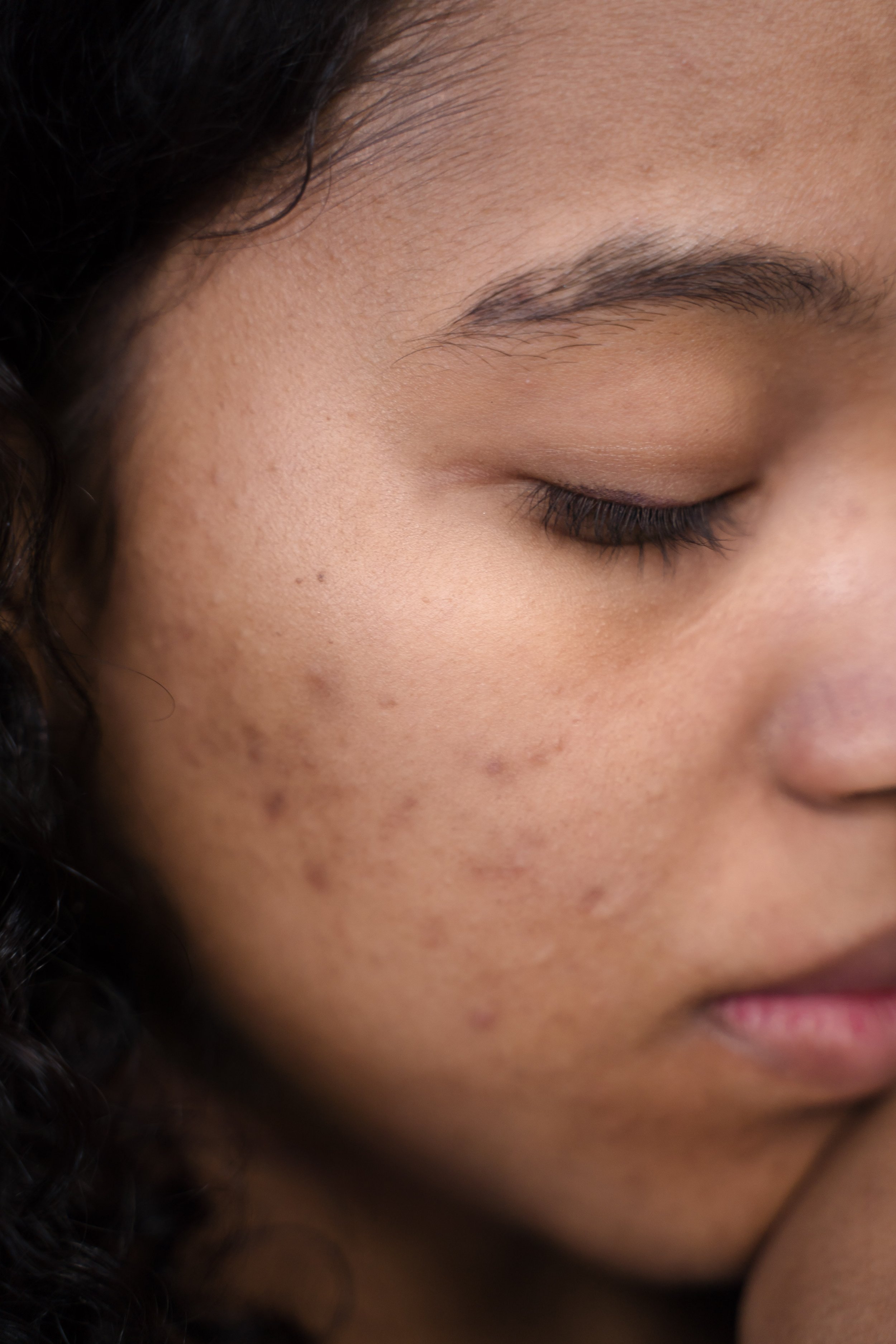Exploring Psychodermatology: Reduce Stress for Healthy Aging Skin Care!
The transformative power of Psychodermatology is an unparalleled approach to the mind-body connection, enabling you to achieve and preserve the youthful vitality of damage-free skin. This isn’t new knowledge, it’s holistic skin care with a new label. We've long known that stress and emotional health (the "psycho" part) go hand in hand with skin health (dermatology). With a slightly altered approach to the origination of the Psychodermatology term, we can use essential oils, self-help techniques, and plant-based skin care as solutions to better skin and healthy aging with attention on emotional health.
Stress, acne, aging and damaged skin
Stress triggers acne breakouts by increasing sebum production and inflammation
Stress can trigger acne breakouts, cause skin damage and aging, or make eczema worse (1). Psychodermatology can help you manage stress, learn relaxation techniques, and develop coping mechanisms. This can lead to improved skin health and a more youthful appearance. In addition, psychodermatology can help you look and feel younger, have more energy, and enjoy a better quality of life - which will also result in lowering stress.
Here are some specific examples of how stress and emotional health can affect the skin:
Acne: Stress triggers acne breakouts by increasing sebum production and inflammation (2).
Aging: Stress produces neurotransmitters that will break down collagen and increase inflammation (3).
Compromised Lipid Barrier Function: The disruption of epidermal permeability barrier homeostasis due to stress can precipitate inflammatory disorders such as atopic dermatitis and psoriasis and makes skin more sensitive to allergens and susceptible to infection (4).
Eczema: Stress can make eczema worse by increasing inflammation and itchiness.
Psoriasis: Stress can trigger psoriasis flare-ups by increasing inflammation.
Here are some of the specific ways that psychodermatology can help you improve your skin health:
Stress management: Psychodermatology can help you to learn how to manage stress through techniques such as relaxation training, meditation, and yoga.
Coping mechanisms: Psychodermatology can help you to develop coping mechanisms for dealing with stress, such as journaling, exercise, and spending time with loved ones.
Skin care education: Psychodermatology can provide you with education about how to care for your skin, develop skin care positive intentions, and assist in choosing the right products.
Psychodermatology can help you to develop coping mechanisms for dealing with stress, such as journaling, exercise, and spending time with loved ones.
The skin emotion connection
The relationship between skin and emotions is a multifaceted interplay involving the neuroendocrine and immune systems, referred to as the neuro-endo-immuno-cutaneous system (NEICS). The NEICS explains how the nervous system, skin, hormones and immunity interact through the release of mediators. Destabilization of the NEICS has been observed in various inflammatory skin disorders and psychiatric ailments (5). An imbalance in any one of these systems will have an affect on all. This connection and synergy means that emotions, as listed above, may develop into damaged skin conditions. Be aware that an imbalance in skin condition, premature aging, or skin disease, such as vitiligo, may cause emotional or depressed states. In many skin conditions the chicken and the egg analogy becomes useful, where finding what caused what may be less than obvious.
Developing a system for stress-reducing skin care
Psychodermatology is defined through the work of dermatologists who are also psychologists or psychiatrists, also psychologist or psychiatrists who are also dermatologists. Either way, this is a rare breed. Always the best solution, as in most health issues, is to take control of your health and mental well-being. This may include finding the right Psychodermatologist or holistic practitioner.
As is the focus of most of my work, I will introduce you to a self-care method of psychodermatology that you can incorporate into your daily life. These methods are based on lifestyle coaching, self-help and the power of positive thinking (intention and law of attraction). Incorporated with the self-help lifestyle practices, the system uses, as a foundation of treatment, plant-based skin care and essential oils as additional therapy to stress reducing strategies for over-all wellness.
The diversity of wellness solutions
As part of the system, or as enhancement, you may seek help from professionals that could include interpersonal therapy, behavior therapy , hypnosis, sound healing techniques, sleep therapy, Traditional Chinese Medicine and breath work. There are a multitude of self-help, lifestyle coaching and emotional therapy practices that will support your healthy aging and damage-free skin care maintenance.
Psychodermatology lifestyle methods
Developing a lifestyle for better mental health and a stress-free life is your path to youthful, healthy skin. A vital piece to this psychodermatology method is the use of emotionally supportive skin care, containing plant-based (nature heals) ingredients and essential oils. There is a very specific style of formulation to create plant-based personal care that has potent emotionally balancing effects.
To begin, these suggestions are common in self-care practices with some additional techniques involving scent-emotion bonding for enhanced results.
Step 1: Create an intention.
Step 2: Meditate! Best to meditate first thing in the morning. Using your intention as a mantra will be ideal in emotionally solidifying your desire for youthful, healthy skin.
Step 3: Create an emotion-scent bond. This is a big part of my lifestyle systems. Using the science of smell and its bond with memory and emotion, a scent may be used as a tool to enhance your intention. Ideally this is an essential oil scent, composed of authentic essential oils having the true therapeutic properties.
Step 4: Use plant-based skin care products. The product should be, and have appearance and scent of, a truly plant sourced product. For best results buy a plant-based serum and cream that does not contain essential oils or any fragrances. Add your scent bonded essential oil blend to the unscented base. This will support the intention and relaxed feelings associated with the emotion-scent bond you created from your meditation and scent bonding practice.
More methods to be stress free with beautiful skin
There are several other techniques that can be incorporated into you relaxation lifestyle methods. This would include
yoga
sound healing and singing
forest bathing
color therapy
Along with these additional practices is the inclusion of visualization techniques and a vision board. To enhance your intention and goal of beauty and emotional health, have a visual image in mind that you can clearly see and, importantly, feel. Use images to create a physical representation of your visualization, called a vision board.
Final, yet so important
A healthy diet, one that especially supports the gut biome, is really at the top of the list to achieve a stress relieving lifestyle. Healthy sleep habits are also supportive, necessary really, to achieve a life absent of chronic stress and anxiety.
And, be sure to breathe.
Citations
Recognizing the mind-skin connection. Some skin conditions have a psychological dimension that may need to be addressed, too. Harv Womens Health Watch. 2006 Nov;14(3):4-5. PMID: 17228440.
Jović A, Marinović B, Kostović K, Čeović R, Basta-Juzbašić A, Bukvić Mokos Z. The Impact of Pyschological Stress on Acne. Acta Dermatovenerol Croat. 2017 Jul;25(2):1133-141. PMID: 28871928.
Chen Y, Lyga J. Brain-skin connection: stress, inflammation and skin aging. Inflamm Allergy Drug Targets. 2014;13(3):177-90.
Garg A, Chren M, Sands LP, et al. Psychological Stress Perturbs Epidermal Permeability Barrier Homeostasis: Implications for the Pathogenesis of Stress-Associated Skin Disorders. Arch Dermatol. 2001;137(1):53–59.
Jafferany M. Psychodermatology: a guide to understanding common psychocutaneous disorders. Prim Care Companion J Clin Psychiatry. 2007;9(3):203-13



